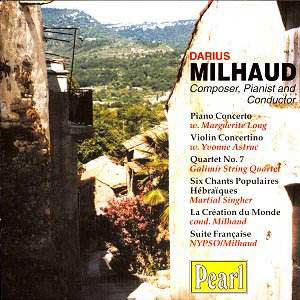The centenary of Milhaud’s birth was marked by a three-disc
set produced by the Phonotèque Nationale that covered historical
recordings from 1928-48. Pearl’s more modest and selective disc concentrates
on more canonical Milhaud works recorded from 1931-46 – though the sole
post war recording is the Suite Française – and the bulk date
from the four years after 1931. The compositions range widely – Concertos,
quartet, ballet, songs and an orchestral suite and Milhaud’s collaboration
is as a pianist or conductor (the only exception is in the case of the
Seventh Quartet, noted on the original record labels as being recorded
"under the direction of the composer" as had been the case
in the Galimir Quartet discs of the Ravel – a good sales gimmick by
adding the composers’ imprimatur). Most of the reissues here are classics
of the twentieth century discography, many in still unsurpassed performances.
Marguerite Long gave the first performance of the Piano
Concerto with Albert Wolff conducting in November 1934 and recorded
it with Milhaud shortly afterwards. It’s a delicious twelve-minute confection,
scintillatingly played by the dedicatee. The Orchestre Nationale had
some highly distinctive woodwind players, amply audible in the barcarolle
second movement and some springy and lissom strings. There’s a compact
effervescence to this movement with its piquancies and an abundance
of orchestral incident. The finale begins as a resolute and resonant
fugato but is soon gallically subverted by the witty and insouciant
piano. The end is splendidly virile and conclusive. The soloist in the
Violin Concerto is Yvonne Astruc, another who gave the first performance,
and a sweet toned and vibrant violinist. The typically woody French
flute behind her lends this delicious work an Arcadian lyricism, each
instrumental strand bursting with verdant life, frisky portamentos and
gorgeous melody coursing through its eight minutes of pulsing life.
The all sibling Galimir Quartet (of Vienna, as the 78 labels invariably
noted, with just a hint of superiority) consisted of Felix, who was
later to become an eminence grise in America and who died in 1999, and
his sisters Adrielle, Renée and Marguérite. Specialising
in contemporary music and no strangers to the recording studios despite
their youth and the relative youth of their quartet (which had only
been founded in 1929) they tackle the languid, jovial and predominantly
undemanding Quartet with their usual tonal integration and imagination.
The four short movements are of broadly equal length and scale; the
Andante is freely swinging with a resolute cello line beneath the effortlessly
avuncular violin writing. There are some clicks in Pearl’s copy during
the Lento.
The six Chants Populaires Hébraïques were
composed in 1925 – the same year as the Seventh Quartet was written.
Milhaud was not an outstanding pianist but he was efficient and accompanies
the excellent young baritone Martial Singher. The songs range from the
lightness of Le Chant du veilleur to the more stentorian Chant
de la Délivérance and Singher’s deepening and
darkening baritone, flexible, mobile and equalized is alive to line
and mood. La Création du Monde is the most famous of the pieces
here and Milhaud was to re-record it in 1958 with the Champs Elysées
Orchestra. This probably offered as near a definitive statement of Milhaud’s
intent with the ballet as we are likely to get and was a staple of the
LP catalogues for many years. In 1931, with an early take on his 1923
ballet, there is, perhaps unsurprisingly, none of the confident familiarity
and the idiomatic touch of later performances. In a rather boxy Parisian
acoustic the playing is dutiful but tentative and cautious; the sectionality
of the work is reinforced by playing that is somewhat caught between
enthusiasm and slight bewilderment.
The selections conclude with the only post-war performance
– the 1946 New York traversal of the Suite Française. An exile
in Mills College, California, the work was commissioned by a publisher
and composed in 1944. In five delightful and very short movements it
encompasses, geographically speaking, Normandie (full of joie de vivre),
Bretagne (craggy and imperturbable), Isle-de-France (frantic, elegantly
propulsive), Alsace-Lorraine (serious tread leading to noble peroration)
and Provence (vigorous, jubilant, sun-kissed and confidently punchy).
A homeland still enmeshed in War recollected with admiration, affection
and love. Robert Layton’s notes are a fine balance of biography and
comment, personal recollection and reflection. The transfers are generally
good. A distinguished and delightful release.
Jonathan Woolf


![]() See
what else is on offer
See
what else is on offer 